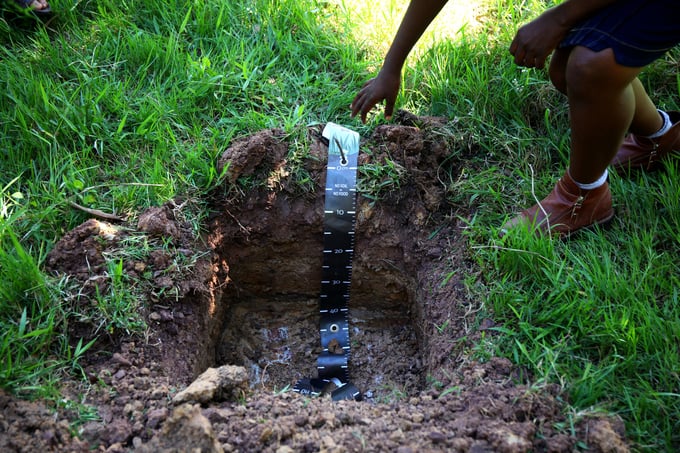May 28, 2025 | 16:23 GMT +7
May 28, 2025 | 16:23 GMT +7
Hotline: 0913.378.918
May 28, 2025 | 16:23 GMT +7
Hotline: 0913.378.918

Healthy and fertile soils are vital in building resilience to the impacts of climate change and transforming agrifood systems.
The Food and Agriculture Organization of the United Nations (FAO) has welcomed the announcement of an additional $10 million from the United States Department of State for projects mapping soil fertility in Ghana and Kenya to promote climate-smart agriculture and adaptation measures, resilient crops, fertilizer use efficiency and soil health.
“Not only will the additional funding from the United States bring the benefits of this project to smallholder farmers and their communities in two more countries but it also underlines the vital role that healthy and fertile soils play in building resilience to the impacts of climate change and to transforming our agrifood systems,” said FAO Deputy Director-General Maria Helena Semedo.
World Soil Day announcement
The announcement was made by U.S. Chargé d’Affaires of the U.S. Mission to the UN Agencies in Rome, Rodney M. Hunter, during global celebrations of World Soil Day 2023. “The United States is excited to contribute an additional $10 million of funding for FAO SoilFER soil fertility mapping projects for Ghana and Kenya,” Hunter said, adding that the funding would “strengthen smallholder agricultural production in these countries, mapping the soil needs, and providing technical assistance to farmers so they will be able to improve soil fertility through more efficient use of fertilizer and water. This will support climate-smart agricultural practices, soil health and the use of resilient crops as part of the Vision for Adapted Crops and Soils (VACS) Program.”
The funding will significantly boost progress with FAO’s ambitious SoilFER (Soil mapping for resilient agrifood systems in the Central America and sub-Saharan Africa), which currently focuses on Guatemala, Honduras and Zambia. The first tranche of funding from the U.S. Government ($20 million) enabled FAO to fast track the impact-oriented project in July 2022.
Addressing fertilizer crisis
The project, funded by the U.S. State Department as part of the VACS Program, aims to address the fertilizer crisis – influenced by costs, availability and risks related to inefficient usage – by providing short- to long-term solutions. The goal of enhancing soil fertility and health, as well as resilience to shocks, encompasses an array of activities. These range from comprehensive soil sampling in the field, robust analysis of soil samples in the laboratories, digital soil information systems, fertilization field test and recommendations, sustainable soil management practices to modern technology tools allowing small-scale farmers to access advanced soil information and data.
Central to the effort is the mapping of soil nutrients and functional soil properties at a detailed level through well-designed soil survey and analysis, as well as developing techniques to monitor them over time. This soil information system is an asset to national authorities and can be used in decision-support systems addressing the judicious use of fertilizers.
The additional funding for the two African countries comes amid increasingly prevalent food insecurity on the continent. Nearly one in four people in Africa (24.0 percent) was facing severe food insecurity in 2022. The prevalence of severe food insecurity rose in Northern Africa, Middle Africa, Southern Africa and Western Africa by 0.8, 1.3, 1.5 and 0.3 percentage points, respectively.
(FAO.org)

(VAN) Vikas Rambal has quietly built a $5 billion business empire in manufacturing, property and solar, and catapulted onto the Rich List.

(VAN) Available cropland now at less than five percent, according to latest geospatial assessment from FAO and UNOSAT.

(VAN) Alt Carbon has raised $12 million in a seed round as it plans to scale its carbon dioxide removal work in the South Asian nation.

(VAN) Attempts to bring down the price of the Japanese staple have had little effect amid a cost-of-living crisis.

(VAN) Fourth most important food crop in peril as Latin America and Caribbean suffer from slow-onset climate disaster.

(VAN) Shifting market dynamics and the noise around new legislation has propelled Trouw Nutrition’s research around early life nutrition in poultry. Today, it continues to be a key area of research.

(VAN) India is concerned about its food security and the livelihoods of its farmers if more US food imports are allowed.